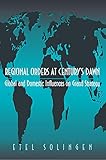Regional Orders at Century's Dawn : Global and Domestic Influences on Grand Strategy / Etel Solingen.
Material type: TextSeries: Princeton Studies in International History and Politics ; 77Publisher: Princeton, NJ : Princeton University Press, [2021]Copyright date: ©1999Description: 1 online resource (352 p.) : 3 line illus. 1 tableContent type:
TextSeries: Princeton Studies in International History and Politics ; 77Publisher: Princeton, NJ : Princeton University Press, [2021]Copyright date: ©1999Description: 1 online resource (352 p.) : 3 line illus. 1 tableContent type: - 9781400822621
- International relations
- POLITICAL SCIENCE / International Relations / General
- Algerian coup (1991)
- Aloni, Shulamit
- Amman Summit (1995)
- Arab Cooperation Council
- Arab Maghreb Union
- Arab-Israeli Wars
- Arafat, Yassir
- Asian values myth
- Ayatollah Khomeini
- Beagle Channel conflict
- Begin, Menachem
- Ben-Gurion, Prime Minister
- Bosnian debacle (1990s)
- Brazilian-Paraguayan Itaipú project
- Casablanca Declaration (1994)
- Chun Doo Hwan
- Clinton administration
- Cruzado plan (Brazil)
- Davos conference (1997)
- Ecuador
- Gourevitch, Peter
- Greater Israel myth
- Gulf War (1991)
- Harkabi, Yehoshafat
- Hub-and-Spoke model
- India-Pakistan War
- Khamenei, Ali
- Kim Kyong-hui
- Korean National Youth (South Korea)
- Lanusse, Alejandro
- Levingston, Roberto
- Mendoza Accord (1991)
- Multipartidaria (Argentina)
- Nuclear Suppliers Group
- Partido da Frente Liberal (Brazil)
- Quadripartite Agreement
- counterfactuals
- democratic advantage theory
- democratic-peace policies
- dependency theory
- economic freedom
- ethnic diversity
- former Soviet Union
- fundamentalism
- imperial strategy
- macroeconomic stability
- macropolitical consensus
- national-security states
- nondemocratic peace
- oil crisis (1970s)
- pacific unions
- JZ1305
- online - DeGruyter
| Item type | Current library | Call number | URL | Status | Notes | Barcode | |
|---|---|---|---|---|---|---|---|
 eBook
eBook
|
Biblioteca "Angelicum" Pont. Univ. S.Tommaso d'Aquino Nuvola online | online - DeGruyter (Browse shelf(Opens below)) | Online access | Not for loan (Accesso limitato) | Accesso per gli utenti autorizzati / Access for authorized users | (dgr)9781400822621 |
Browsing Biblioteca "Angelicum" Pont. Univ. S.Tommaso d'Aquino shelves, Shelving location: Nuvola online Close shelf browser (Hides shelf browser)

|

|

|

|

|

|

|
||
| online - DeGruyter Spiritual Interrogations : Culture, Gender, and Community in Early African American Women's Writing / | online - DeGruyter The Red Thread : Buddhist Approaches to Sexuality / | online - DeGruyter Contesting Spirit : Nietzsche, Affirmation, Religion / | online - DeGruyter Regional Orders at Century's Dawn : Global and Domestic Influences on Grand Strategy / | online - DeGruyter Work and Welfare / | online - DeGruyter The Brink of Peace : The Israeli-Syrian Negotiations / | online - DeGruyter Manufacturing Ideology : Scientific Management in Twentieth-Century Japan / |
Frontmatter -- CONTENTS -- ABBREVIATIONS -- PREFACE -- PART ONE The Theory -- CHAPTER ONE Introduction -- CHAPTER TWO Internationalization and Political Coalitions -- CHAPTER THREE Coalitions, Strategic Interaction, and Regional Outcomes -- CHAPTER FOUR Economic Liberalization, Coalitions, and the Democratic Peace -- PART TWO The Empirics -- CHAPTER FIVE The Southern Cone: Argentina and Brazil -- CHAPTER SIX The Middle East -- CHAPTER SEVEN The Korean Peninsula -- PART THREE Implications -- CHAPTER EIGHT Theory and Policy: An Agenda -- REFERENCES -- INDEX
restricted access online access with authorization star
http://purl.org/coar/access_right/c_16ec
Etel Solingen provides a comprehensive explanation of foreign policy based on how states throughout the world have confronted the rapid emergence of a global economy and international institutions. A major advance in international relations theory, Regional Orders at Century's Dawn skillfully uses a key issue--internationalization--to clarify other recent debates, from the notion of a democratic peace to the relevance of security dilemmas, nationalism, and the impact of international institutions. The author discusses in rich detail the Middle East, Latin America's Southern Cone, and the Korean peninsula, and builds on examples drawn from almost every other region of the world.As Solingen demonstrates, economic liberalization--with its dramatic political and economic consequences--invariably attracts supporters and detractors, who join in coalitions to advance their agendas. Each coalition's agenda, or "grand strategy," has consequences at all levels: domestic, regional, and international. At home, coalitions struggle to define the internal allocation and management of resources, and to undermine their rivals. Throughout their regional neighborhoods, coalitions opposing internationalization often compete for dominance, sometimes militarily. Coalitions favoring internationalization, instead, often cooperate. At the global level, each coalition finds support for its "grand strategies" from different international institutions and from competing global economic trends. Solingen's concept of "grand strategy" proposes more than a theory of foreign policy and explains the role of nationalism and ethno-religious revivalism in the politics of liberalization.
Mode of access: Internet via World Wide Web.
In English.
Description based on online resource; title from PDF title page (publisher's Web site, viewed 01. Dez 2022)


